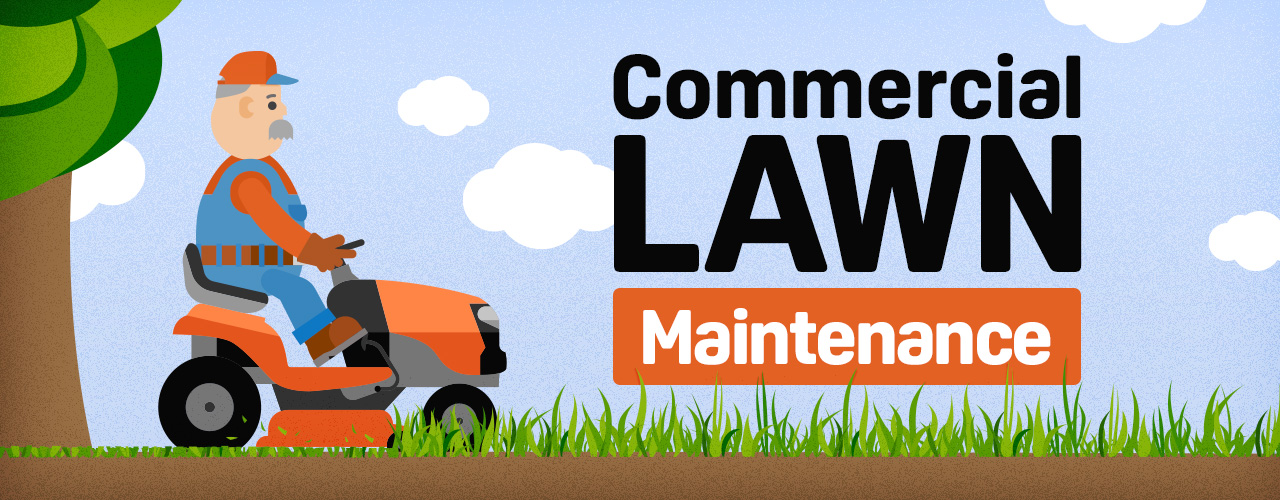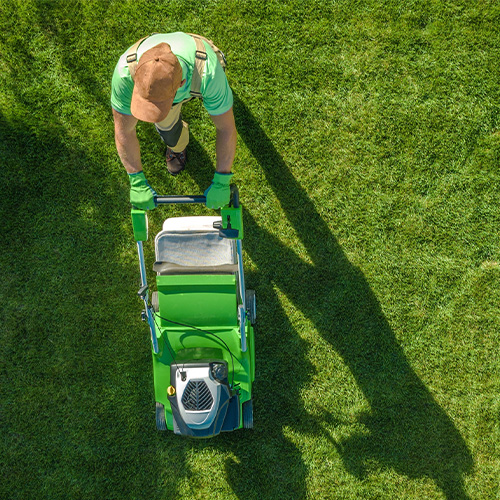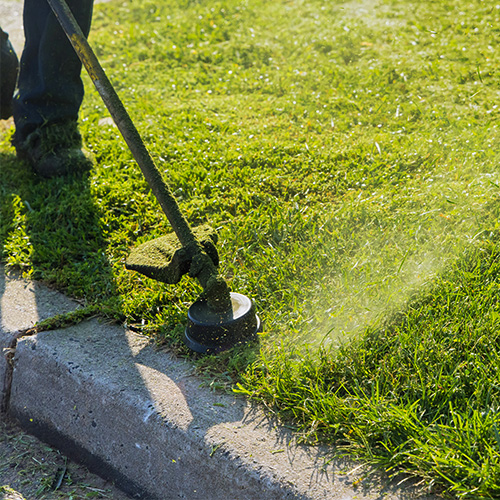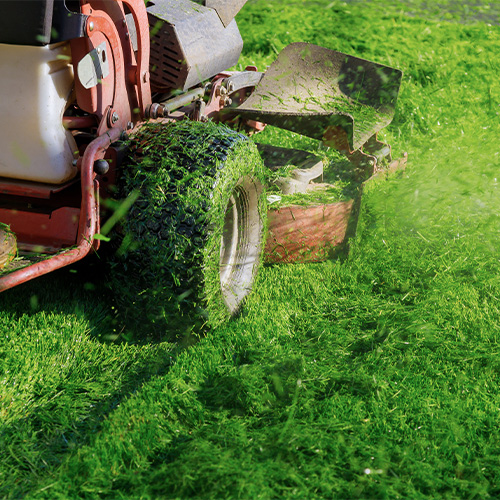
Lawn care plays a crucial role in upholding the appearance of your property and creating a quality outdoor space for your guests. Factors such as drainage, dry spots, and pests can significantly impact the health and aesthetics of your grass and landscaping, and failing to address these issues promptly can leave a negative impression on customers and visitors. Whether you tackle lawn maintenance tasks independently or hire a professional company, you must stay proactive and consistent in caring for your commercial property. Following the proper maintenance practices ensures your lawn remains healthy, vibrant, and visually appealing throughout the year.
Shop All Lawn Care Tools and EquipmentLawn Treatment Schedule

Maintaining a lush, green lawn requires a year-long commitment to proper lawn care practices. Each season presents challenges and opportunities for promoting healthy grass growth and preventing common lawn issues. With a well-structured lawn treatment schedule, you can ensure that your commercial property's lawn remains healthy.
Spring Lawn Treatment
In the spring, focus on preparing your lawn for the growing season ahead. Although the exact time you should start will vary depending on your location, there are many factors to prepare for when spring draws near. Here are the key steps to include in your spring lawn treatment regimen:
- Pre-emergent and post-emergent weed and crabgrass control: Spring is the ideal time to address weed and crabgrass issues before they become a problem. Pre-emergent weed control products work by creating a barrier that prevents weed seeds from germinating, while post-emergent weed control products target and eliminate weeds that have already sprouted.
- Synthetic fertilizer: Synthetic fertilizers, derived from human-made compounds, offer a convenient and effective way to feed your lawn with the nutrients it needs to thrive.
- Insecticides: Insects can wreak havoc on your lawn, causing damage to the grass, creating unsightly patches, and damaging roots. In the spring, consider applying insecticides to repel or eliminate unwanted pests, such as ants or chinch bugs, before they cause significant harm.
- Grub control: Grubs are the larvae of beetles that can cause extensive damage to grass roots if left unchecked. By performing grub control in the spring, you can effectively eliminate these pests before they hatch and begin feeding on your lawn's root system.
Summer Lawn Treatment
Summer months can be hot and dry, creating unique lawn care challenges. Because of this, your lawn may require extra care. Keep the following practices in mind as you devise your summer lawn treatment schedule:
- Weed control: Summertime is when weeds can quickly take over your lawn. Perform regular weed control by removing weeds that have sprouted or were not killed during the spring treatment.
- Organic fertilizer: Organic fertilizers are gentler on your lawn compared to synthetic fertilizers. They provide a slow and steady release of nutrients, promoting healthy growth during the hot summer months.
- Insecticides: Apply insecticides to help eliminate unwanted guests that may have nested in your lawn.
- Nutsedge treatment: Nutsedge is a common weed that can be particularly troublesome in the summer. It thrives in warm, wet conditions and can become a problem if you regularly water your lawn. Use herbicides specifically designed to target nutsedge to keep your lawn looking its best.
Fall Lawn Treatment
Even as fall arrives and the colder weather sets in, there is still much to do for your lawn. Much of what you do during the colder months can help ensure a healthy lawn in the upcoming year. Follow the tips below for the best fall lawn care results:
- pH testing: Soil pH testing allows you to measure the acidity or alkalinity of your soil and determine the availability of nutrients for your grass. Test soil pH levels at least every three years to ensure optimal growing conditions for your turf.
- Synthetic fertilizer: Synthetic fertilizers provide essential nutrients that may be lacking in the soil.
- Gypsum: Gypsum improves soil structure by breaking up compacted soil, increasing drainage, and reducing runoff. By applying gypsum in the fall, you can enhance the overall health of your turf and promote better water infiltration and root development.
Winter Lawn Treatment
While the grass may appear dormant, there are still steps to take during winter to maintain its condition. The steps you take during the winter months help prevent long-term damage to your lawn, saving you time and money in the long run.
- Weed control: In some regions, late winter is the ideal time to apply pre-emergent weed control products to prevent the germination of weed seeds. Post-emergent weed control may also be necessary to target any existing weeds that have sprouted despite the cold weather.
- Winter weather chemical safety: Another consideration for winter lawn treatment is the use of chemicals like ice melt as you prepare your restaurant for winter weather. When choosing these products on your sidewalks or parking lot, it is crucial to be selective and cautious. Using the wrong type of ice melt or applying too much can damage roots and negatively impact the health of the grass.
Lawn Maintenance Schedule

Commercial lawn maintenance requires careful planning and execution. Lawn maintenance refers to the mowing, trimming, and care of a lawn, while lawn treatment refers to seeding and applying chemicals to a lawn. While many individuals may associate lawn care with the warmer months, maintaining a commercial lawn is an ongoing process that involves specific tasks for each season. Adhering to a structured maintenance schedule allows owners to promote the longevity and vitality of their outdoor landscapes.
Spring Lawn Maintenance
Spring is crucial for commercial lawn maintenance as it sets the foundation for a healthy and vibrant landscape. To ensure the optimal growth and appearance of your lawn, several key tasks should be performed.
- Watering: Adequate hydration is vital for promoting root growth and overall lawn health. It is advisable to water deeply and infrequently during spring to encourage root penetration and drought tolerance.
- Mowing: Regular mowing not only helps to maintain a tidy appearance but also promotes healthy growth. Adjust the mower height to allow grass to grow taller in the spring, which can help shade the soil and prevent weed growth.
- Dethatching: Thatch buildup prevents water, air, and nutrients from reaching the soil and roots, leading to declining lawn health. Dethatching involves removing the layer of dead grass and debris that accumulates on the soil surface, allowing for better water absorption and root development.
Summer Lawn Maintenance
Summer is a busy time for lawn maintenance, as the warm weather can lead to accelerated growth and potential stress on the grass. Although there isn't much variance in what you do during the summer, the lawn maintenance steps you take must be performed frequently. To keep your lawn in good condition during the summer months, devise a maintenance routine with the following steps:
- Watering: During the summer, lawns typically require about 1 to 1 1/2 inches of water per week, either from rainfall or irrigation. Watering early in the morning is ideal to minimize evaporation and fungal growth.
- Mowing: Experts recommend that you mow your lawn every 4 to 6 days during summer. For the best results, raise your mower to 1/2 inch.
Fall Lawn Maintenance
As the seasons change, you must adjust your lawn maintenance schedule to be proactive. Fall lawn maintenance plays a crucial role in preparing your commercial property for the winter months and setting the foundation for lush greenery in the spring.
- Soil testing: Fall is an ideal time to conduct a soil test to assess nutrient levels and pH balance. By understanding the specific needs of your soil, you can make informed decisions regarding fertilizer applications and amendments to promote optimal growth.
- Watering: Proper hydration will help your grass establish roots and withstand the winter months.
- Dethatching: Fall is an opportune time to dethatch your lawn to remove this layer of organic matter and promote better soil aeration and drainage.
- Aeration: Core aeration helps alleviate soil compaction and allows nutrients, water, and oxygen to penetrate deep into the root zone. This process promotes root growth, improves nutrient uptake, and enhances turf health.
- Seeding: Fall is the prime time to seed your lawn to fill in bare patches, improve turf density, and introduce new grass varieties. Overseeding in the fall allows the seeds to germinate and establish before harsh winter conditions set in.
Winter Lawn Maintenance
In many parts of the world, there won't be much lawn maintenance to do during winter. To set yourself up for success, you should take this time to perform maintenance on your equipment and stock up on the chemicals and tools you'll need for the next year.
- Tune up equipment: This includes inspecting and servicing mowers, trimmers, blowers, and other tools to ensure they are in good working order. Regular maintenance not only extends the lifespan of your equipment but also helps prevent breakdowns during crucial winter maintenance tasks.
- Invest in new equipment: Upgrading to newer models of mowers, blowers, and snow removal equipment can improve efficiency and effectiveness, making it easier to keep your property looking its best even in challenging winter conditions.
- Stock up on treatment supplies: Purchase herbicides, insecticides, and fertilizer so that you have them on hand once the growing season arrives.
Commercial Lawn Care Equipment

Whether you manage a lawn care business or are looking to invest in lawn care equipment for your commercial property, you should invest in the proper tools and equipment. There are several lawn care tools that every commercial landscaper should consider investing in to ensure efficient and effective maintenance:
- Lawn mower: Depending on the size and type of your property, you can choose between a hand mower for smaller areas or a riding mower for larger expanses of grass.
- Trimmer: Trimmers are essential for creating clean and polished edges along fence lines, sidewalks, and flower beds. They give your lawn a professionally manicured look.
- Hedge trimmer: Keeping hedges neatly trimmed and shaped is important for the overall appearance of your landscape. Hedge trimmers make it easy to maintain shape and height.
- Edger: Edgers create crisp boundaries or breaks between different areas of your lawn, such as between the grass and a sidewalk or parking lot.
- Blower: Blowers remove eaves, grass clippings, and other debris from your lawn. They help keep your landscape clean and tidy, making it visually appealing.
- Spreader: Spreaders evenly distribute fertilizer, insecticide, herbicide, and other lawn care products across your lawn. They ensure that these products are applied efficiently and effectively.
- Sprayer: Sprayers are another tool for applying fertilizer, herbicides, and other lawn care chemicals to your lawn. They evenly distribute these chemicals so that they can be properly absorbed by the grass.
- Chainsaw: Chainsaws are used for heavy-duty tasks such as removing tree stumps, cutting down small trees, or clearing debris from your property.
- Hoses: Hoses allow you to efficiently distribute water across your landscape to achieve proper hydration.
- Buckets and lawn bags: Buckets and lawn bags make it easy to collect and transport debris, grass clippings, and other materials.
- Hand tools: Hand tools such as shovels, rakes, pruners, and other garden tools are essential for various maintenance tasks in your lawn and landscape. These tools help you efficiently plant and prune your plants and trees.
Back to Top
By prioritizing commercial lawn maintenance and following best practices, you can create a welcoming and professional environment that enhances your business's overall appeal and reflects your commitment to maintaining a well-kept property. Regular inspections and proactive measures can help prevent potential problems and maintain a lush and inviting outdoor space for your business.





